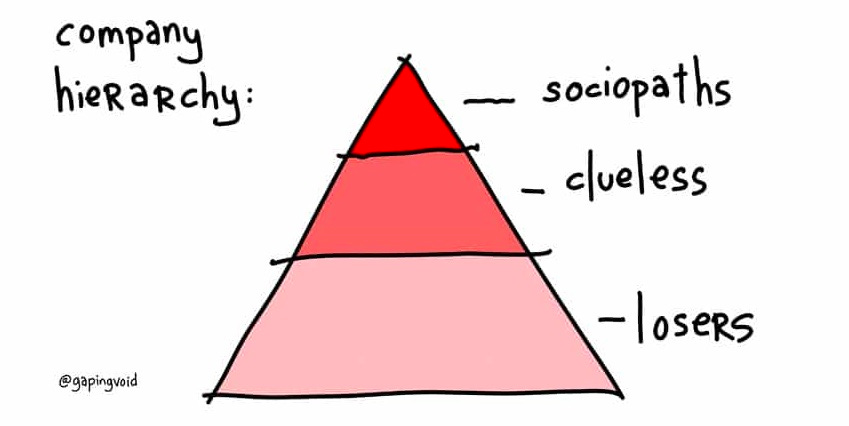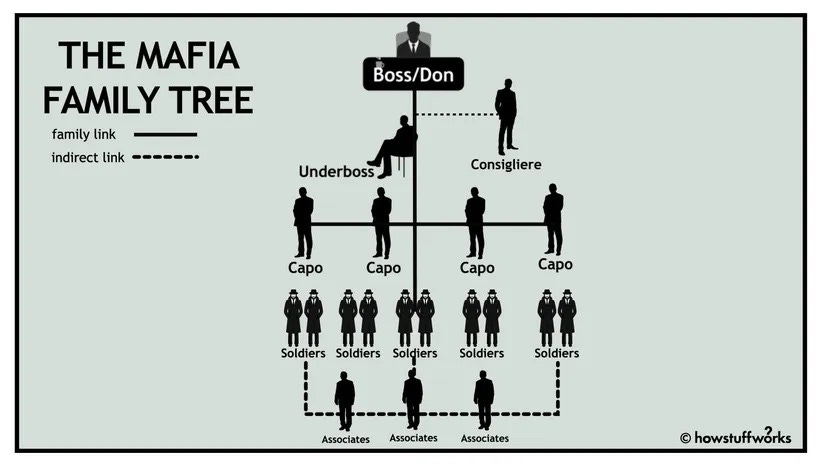Sponsored by Practical Founders Podcast
This newsletter is brought to you by the Practical Founders Podcast who recently interviewed somebody you should really listen to.
Thanks PFP!
Say what you want about organized crime, at least it’s organized.
Which is more than I can say for a lot of companies I’ve seen over the years.
—
In the early 20th century, German sociologist and periodic insane asylum patient, Max Weber, came up with his theory of bureaucracy.
It was mostly ignored. Long story.
In 1931, two decades after Weber’s ideas on bureaucracy had hit the newsstands – or whatever stands they had back then – Lucky Luciano organized the mafia. It’s unclear whether Lucky read Weber’s essays – it’s unclear whether Lucky ever read anything – but he managed to create a hierarchical structure for crime that adheres to Weber’s bureaucratic theories.
The rapid growth of the mafia from that moment proved the validity of Weber’s concepts.
It wasn’t until 1947 that corporations began implementing Max Weber’s concepts as well. And so began the organizational hierarchy that we know today. The one that criminals had been doing well before legit corporations.
That’s the thing about the good criminals, they are always on the cutting edge.

The Decline of Hierarchy
Organizational hierarchies flourished through the rest of the 20th century. However, somewhere around the first Internet boom of the early 2000s, traditional hierarchies became more nebulous.
The Internet ushered in a Wild West-like vibe for organizational structure. One reason for this is that a whole lot of new leaders felt like they needed to buck the status quo. Soon job titles morphed into less of a hierarchical model and more of a creative writing contest:
Chief Troublemaker
Sales Ninja
Conversation Architect
Huh?!
Now, it sometimes seems that clearly defined organizational structures are as much in retrograde as a turtle at a vulture shindig.
Which brings us right back to organized crime.
When organized crime runs a better company than yours, it’s time to start thinking about how you’re running your company.

The Titles Example
“I don’t care about job titles,” I hear some leaders say.
It’s a very common refrain from entrepreneurial leaders who have yet to conquer their fears of structure and scale.
As far as I’m concerned, leaders are allowed to not care about titles. That’s all fine and good. You be you. It’s just that the leader’s feelings about this are irrelevant.
Employees care about titles and those are the feelings that matter. So whether you like structured job titles or not, do them anyway.
Titles define hierarchy.
Titles let people know what decisions they can and can’t make.
Titles outline your job and responsibility.
Titles help people grow their careers.
Imagine if organized crime had no titles. You know what would happen? It would be disorganized, which is exactly the chaotic state it bumbled through before Lucky Luciano saved the day.
Now, all organized crime families have a very clear hierarchy.
Boss —> Underboss —> Capo —> Soldier —> Associate

Everybody understands to whom they report and how they can succeed. Even more, no crime family is changing the title structure. You don’t see a mafia guy going around handing out a business card with some fancy “Extortionista” type title. That kinda s**t wouldn’t last long in the organization.
If criminals can create organized titles, so can you. I believe in you.
The Accountability Example
“Nobody has a sense of ownership in what they do,” I hear many leaders say.
Here’s a little bit of insight for you…
Employees won’t have a sense of ownership unless:
- there is purpose
- they clearly understand their goals
- there are consequences for their actions (good and bad).
Your sole job as a leader is to accomplish those things.
That’s it. That’s your job.
You know who is really good at making sure those three things always exist? Organized crime syndicates, that’s who.
You know who is not so good? Legit business leaders.
In fact, lack of accountability is the number one weakness of company leaders in the United States.
Let’s take a quick look through each of these three things.
1. Create a purpose
There are umpteen studies proving that people are more productive and more efficient when they align with a company’s purpose.
“We are going to own all of the crime in Tulsa, Oklahoma”. That’s a purpose that motivates employees. It shouldn’t be your purpose, but I just use it as an example.
If all successful organized crime families can have a purpose, so can you. What’s yours?
2. Clearly understanding goals
Once there is an organizational purpose, leadership can create the overarching goals to achieve that purpose.
Leadership can then use that knowledge to give everybody else their individual goals. (Tip: make sure they are SMART goals)
Can you guess who does a good job with this? Yup, organized crime.
“You need to be earning $40k per month within three months by focusing on extortion and the drug trade in the Lower East Side.”
You see how clear that goal is?
3. Create accountability.
People need to know that there is always accountability. When they perform well, they should be rewarded. When they don’t perform well, there should be consequences.
You don’t have to kill anybody – in fact, I strongly recommend you avoid that – but it sure is a good idea to get rid of the people who continually fail to meet their goals.
You know who does a good job with this? Exactly! Organized crime.
People excel when there is clear direction, clear goals, and accountability. When they earn more than expected, perhaps they share in the profits. But when they miss their goals, it’s time for a sit-down.
—
If it weren’t for the whole crime part of organized crime, they’d be one helluva great company to work for. You should pay more attention to how they conduct their business. Maybe you could learn a thing or two.
Oh, and if you don’t…. well… I’d hate to see your office go up in flames. I hear there is an arson problem around these parts, if you know what I’m sayin’.
Somewhat Relevant Quote
“It’s about time law enforcement got as organized as organized crime.“ at whatever cost.
Rudy Giuliani, former Mayor, former 9-11 hero
Random News
Honk – Let it be known, Los Angeles doesn’t have the worst traffic in the world
Smile – Looking to move? Might as well go to one of the happiest cities
Moving Irony – Turns out more people are moving out of the happiest state
Hic – Good news. There’s now a cure for being drunk.
